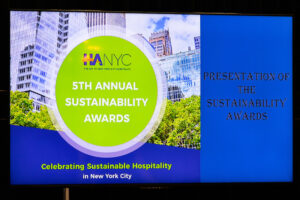by Claire Lane
PROVIDENCE, R.I. – Are you ready? This was a question we posed to clients before the pandemic, challenging them to think about a host of issues that will shape the future: the expectations of Millennials/Gen Z as workers and customers; the rising pressure from investors for corporate action related to climate change and supply chain transparency; and the importance of diversity and inclusion.
Post-pandemic? This question is even more urgent today as those challenges have only grown more relevant.
The enormous disruption and trauma created by the pandemic will continue even as some aspects of life, such as leisure travel, begin to resume. People are rethinking priorities and employment decisions; companies are reconsidering their requirements for office space and corporate travel. If our lives will never be quite the same, what will we seek in the future?
 As the industry looks to build back better and smarter from lessons learned during the pandemic, one topic is more relevant than ever because it encompasses so many challenges faced today: sustainability. This term’s meaning has broadened to include not only environmental but also social and corporate governance issues. Investors often use the term “ESG” to describe the elements of sustainability by which they judge a company’s future risk as an investment.
As the industry looks to build back better and smarter from lessons learned during the pandemic, one topic is more relevant than ever because it encompasses so many challenges faced today: sustainability. This term’s meaning has broadened to include not only environmental but also social and corporate governance issues. Investors often use the term “ESG” to describe the elements of sustainability by which they judge a company’s future risk as an investment.
ESG issues include many topics that will be familiar to those working in hospitality. What are the environmental impacts of your hotel’s operations? How does your management address diversity and inclusion in your workforce? How does your hotel support local economic and workforce development? Who is responsible for sustainability policies and targets?
Denise Naguib, vice president of Sustainability and Supplier Diversity at Marriott International, has noted the increasing relevance of sustainability. “I’ve never spoken with as many investors as I have recently,” she says. “The interest is real, and the expectations for performance and transparency are growing.”
Investors are seeking action from the corporate sector to address climate change through science-based targets. Several hospitality companies have publicly set or committed to setting targets through the Science-Based Targets Initiative (SBTi) just in the past year. The impact of these targets will be felt across the industry as brands engage their franchisees, other business partners and their supply chain to help meet these public targets.
As a result, regardless of the size of the company that you work for, the pressure is on to meet sustainability targets in hospitality. It’s not only investors who are interested, so are many customers and current or potential employees.
 Pursuing a sustainability strategy not only helps companies with risk management, it also provides an opportunity to engage employees more meaningfully as well as potentially attracting new recruits during a time of workforce uncertainty. At the Fehlig Group, we have clients who have successfully built employee engagement and growth opportunities through involvement in sustainability initiatives at their company or property, whether those relate to the environmental impact of hotel operations, or the health and well-being of associates and their communities.
Pursuing a sustainability strategy not only helps companies with risk management, it also provides an opportunity to engage employees more meaningfully as well as potentially attracting new recruits during a time of workforce uncertainty. At the Fehlig Group, we have clients who have successfully built employee engagement and growth opportunities through involvement in sustainability initiatives at their company or property, whether those relate to the environmental impact of hotel operations, or the health and well-being of associates and their communities.
Kim Greene, general manager at the Renaissance Providence told us that employee collaboration in sustainability programs “fostered a sense of pride and engagement that resulted in direct, measurable results in our employee turnover and satisfaction rates.”
Sustainability initiatives offer ways for employees to connect their values – whether that be related to the environment, social issues, or community development opportunities – to their work and to grow by taking on projects outside their current role within hospitality. Far from being an “add-on” task, these types of initiatives can help your business be recognized as a great place to work, build resilience for the future, and go a long way towards answering the question, “Are you ready?”
For more information about how to implement a sustainability strategy, or leverage the programs you have in place, reach out to Elizabeth Shanley at [email protected].
Claire Lane is a sustainability consultant at The Fehlig Group, Providence, R.I.
